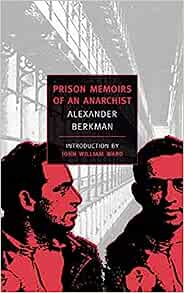Prison Memoirs of an Anarchist (1912) recounts the years Alexander Berkman (1870-1936) spent in prison for an ill-judged political act. Born in Lithuania, then part of the Russian Empire, he emigrated to the United States in 1888. In New York City he became involved in radical politics and was a close associate, and sometime lover, of Emma Goldman (referred to as ‘The Girl’ in the book) who supported him and remained his political touchstone throughout his ordeal.
In a political action intended to promote class struggle, he attempted to assassinate industrialist Henry Clay Frick at the Carnegie Steel Works in 1892. He was motivated by Frick’s role in the Homestead steel strike, during which a number of workers had been killed in a brutal crackdown. Berkman shot Frick twice before being restrained, but Frick survived. As a result of the attempt, Berkman was sentenced to 22 years in prison. He was incarcerated from 1892 to 1906 in the Western Penitentiary, Pittsburgh, Pennsylvania, before being released on licence.
White incarcerated, he kept extensive notes, in difficult circumstances. They were worked up after release into The Prison Memoirs of an Anarchist, published by Goldman’s Mother Earth Press. It is a collection of his thoughts, experiences, and observations on the anarchist movement and prison life, as well as reflections on the relationship of the individual to the state, highlighting the ways the legal system was used as a tool of oppression to maintain the power of the ruling class. He took a principled stand in the face of oppressive authority, while he was singled out because of his political views and refusal to be cowed. His initial distance from what he considered lumpen elements lacking any kind of class consciousness developed into affection and compassion for those who had fallen into this hellish situation. That affection was returned by his fellow inmates.
The book depicts everyday prison life and the individuals who were subject to its rigours. It reveals the harsh, sordid and dehumanising conditions prisoners were subjected to, including physical abuse, inadequate food and medical care, forced labour in the prison workshops, and limited access to education and recreational activities. Severe punishments were meted out for the slightest infraction of arbitrary rules. Berkman details the psychological toll of imprisonment, the loss of personal freedoms we take for granted and the feeling of isolation from the outside world; the sympathetic treatment of homosexuality as a response to a world without women was groundbreaking.
His personal experiences are intertwined with a broader socio-political analysis, dissecting the social and economic factors contributing to crime and the imprisonment of marginalised communities. He addresses the injustices inherent in a system that prioritised punishment over rehabilitation and perpetuated cycles of criminality, arguing prisons were designed to break the spirits of those sent there, leaving them unfit for life on the outside. He too experienced difficulties on release, but the book ends with him once again throwing himself into political activism with renewed vigour.
Berkman explores the ideological and philosophical underpinnings of his politics. He reflects on his motivations for the attempted assassination and its implications, assessing the effectiveness of bloodshed as a means of achieving political change. While initially committed to the idea of employing it to overthrow the government, his time in prison led him to reconsider this stance, and he gradually acknowledged the importance of nonviolent resistance and the need for alternative forms of political organisation to achieve social progress.
The introduction to the New York Review of Books edition by John William Ward, originally published as an essay in the NYRB in 1970, charts the evolution of Berkman’s thought. Ward characterises Prison Memoirs as a bildungsroman in which the author gradually achieves a more nuanced view of violence than he had when he tried to kill Frick. Berkman comes to distinguish political conditions in the United States, with its low level of class consciousness and subtler forms of oppression, from those in Russia, where the despotism was stark and his attentat would have had a greater purpose. He appreciates that humanity is a collection of living individuals, not an ideological abstraction, and the pursuit of political ends must be social rather than individual. The reader is able to see the humanity gradually emerge from Berkman’s doctrinaire principles, but with his determination to build a just world undimmed.

